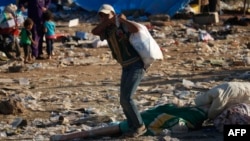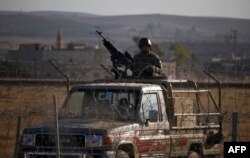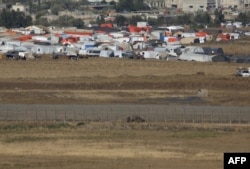The ongoing negotiations between Syrian rebels and Russia on the fate of the rebel-held Daraa governorate in southern Syria are going nowhere, Syrian activists said.
The Crisis Management Team, a group of rebel and civilian delegates from Daraa engaged in negotiations, issued a statement Monday announcing plans to pull out of the talks because of rifts between different rebel groups working under the umbrella of the Free Syrian Army.
The statement added that the conditions provided by the Russians are "humiliating," and called on all civilians to prepare for war.
"We are calling everyone to take up arms and fight till we issue further statements appointing the military leadership that will lead the liberation war," the statement said.
The Syrian government has shifted its attention to southern Syria after regaining control and securing all enclaves held by rebels in Damascus and its countryside. The offensive on Daraa started June 19, with a ground campaign by Syrian government troops, and Russian jets beginning airstrikes on the area June 23.
Cease-fire agreement
In July 2017, Jordan brokered a cease-fire agreement in southern Syria between the U.S. and Russian forces. That agreement spelled out stability in southern Syria until last month.
Daraa is also included in a de-escalation zone agreement signed in May 2017 by Turkey, Iran and Russia.
Khmeimim Air Base, operated by Russia in Latakia governorate in western Syria, claimed on its media channel on Facebook that Russia is still committed to the de-escalation agreement, and its airstrikes only target rebel groups violating the cease-fire.
Jordan and Israel are intensifying their political efforts to put an end to the new war started on their borders. Both countries announced their willingness to provide humanitarian aid, but said they will not open their borders for the refugees to enter.
Israel's military issued a statement Sunday warning Syrian troops to keep their distance from its Golan Heights borders, adding that Israel will maintain its nonintervention policy.
Jordanian Foreign Minister Ayman Safadi announced on Monday a planned visit to Russia this week where he will meet his Russian counterpart, Sergey Lavrov, to discuss the situation in southern Syria.
"I am looking forward to a deep and an honest discussion with Mr. Lavrov to reach a cease-fire and let people stay on their land and secure humanitarian aid to them," Safadi said in a televised announcement Monday.
Thousands displaced
U.N. Secretary-General Antonio Guterres on Saturday called on all parties to respect international humanitarian agreements and work toward a cessation of hostilities, protect civilians and secure safe passages for humanitarian aid.
The United Nations High Commissioner for Refugees in Jordan estimates about 270,000 refugees have fled the escalating war in southern Syria, which is creating another humanitarian crisis in the country that has been ravaged by seven years of war.
Abdulllah Nassar, a member of the White Helmets in Daraa, told VOA that civilians are moving to areas closer to the Israeli border to avoid shelling and airstrikes.
"Some villages were wiped out, international neglect of the refugees' suffering, and people left their homes behind and now they are sleeping on the ground under the trees, nothing more to say," Nassar said.






